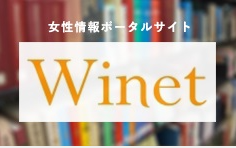Cooperation with JICA
- HOME
- International Cooperation
- Cooperation with JICA
- FY2018 Knowledge Co-creation Program "Promotion of Networking among ASEAN Countries on Anti-Trafficking in Persons”
Cooperation with JICA
- Event Report
-
FY2018 Knowledge Co-creation Program "Promotion of Networking among ASEAN Countries on Anti-Trafficking in Persons”
Date:October 24 to November 7, 2018
National Women’s Education Center (NWEC) held the FY2018 Knowledge Co-creation program“Seminar on Promotion of Networking among ASEAN Countries on Anti-Trafficking in Persons” from October 24 to November 7, 2018 as a project commissioned by Japan International Cooperation Agency (JICA). The seminar was attended by 13 people overseeing anti-TIP measures in eight countries in the ASEAN region: Thailand, Myanmar, Vietnam, Laos, the Philippines, Cambodia, Malaysia, and Indonesia.
Focusing on the prevention of trafficking in persons (TIP) and the protection of victims in the eight participating countries as well as Japan, participants learned about various public and private initiatives and case examples, and exchanged their views. First half of the seminar through lectures and study tours was an introduction to public and private systems, and the initiatives taken based on the Japanese Government’s Action Plan of Measures to Combat Trafficking in Persons. After the input, participants presented country reports and shared case examples while exchanging their views. Final Presentation and Discussion Seminar" participants affirmed the promotion of collaborative relationships in the ASEAN region on the eradication of TIP and the protection of victims from their standpoint.
1. Highlights from the training
1st week
On the first day, purpose of the training were explained in the orientation. On the 2nd day, visited to Cabinet Secretariat was conducted, where Japan’s implementation structure, publication of annual reports, outline of the actions taken by relevant organizations, statistics all based on the 2014 Action Plan of Measures to Combat Trafficking in Persons were explaned. In the afternoon, participants toured the Tokyo Metropolitan Women’s Consulting Center facilities, and learned about the protection of victims by local governments.
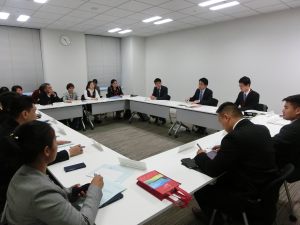 2nd day: at the Cabinet Secretariat.
2nd day: at the Cabinet Secretariat.
On the 3rd day, participants visited social welfare corporation, Ichiryukai, and toured maternal and child self-reliance support facility and the children’s foster-care facility. They learned about the role each facility plays and its relation to the local community.
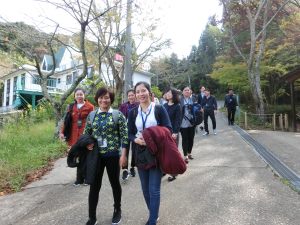 3rd day: Tour of Ichiryukai
3rd day: Tour of Ichiryukai
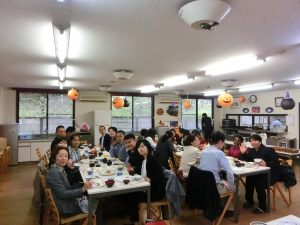 A luncheon with the facility staff
A luncheon with the facility staff
On the 4th day, participants met three multi-language interpreters from Waelaa-Waaree that supports foreign victims of TIP and DV. Situation of clients and why the victims need long-term support and that cooperation between public institutions and the private sector is important were explained. In the evening was, a study tour organized by a general incorporated association, Colabo. After observing the situation in the streets of a bustling area, support activities Colabo offers in collaboration with local governments, such as providing a place for girls to stay were explained. Sexual exploitation of young adults is a pressing issue in every country and participants engaged in a lively exchange.
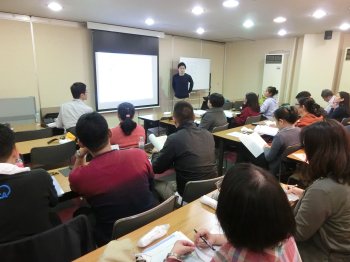 4th day: Discussion session after the study tour.
4th day: Discussion session after the study tour.
On the 5th day, the participants visited the Tokyo Regional Immigration Bureau. After a briefing by the bureau on cases of human trafficking, they took a tour of the facilities. In the afternoon, they were briefed by a representative of the National Police Agency on the crackdown on human trafficking crimes in Japan.
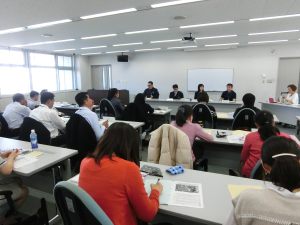 5th day: at the Regional Immigration Bureau.
5th day: at the Regional Immigration Bureau.
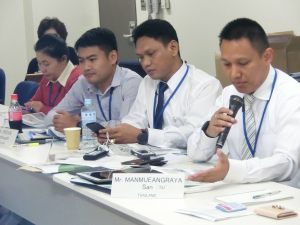 Session on Measures by National Police Agency
Session on Measures by National Police Agency
On the 6th day, the participants moved to NWEC to receive training. After a welcome address by a NWEC Vice President, the participants were explained on information dissemination, training, research, international contribution, and publications which NWEC works on to promote gender equality.
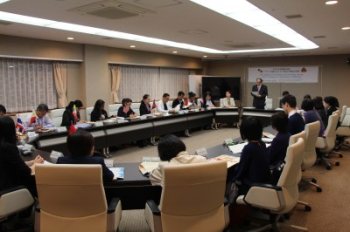 6th day: Welcome address by Mr. Nakazawa, NWEC Vice President.
6th day: Welcome address by Mr. Nakazawa, NWEC Vice President.
In the afternoon, country reports were presented by the eight participating countries, and a Q & A session was followed, further promoting mutual understanding of efforts being made in each country.
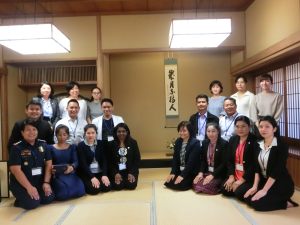 6th day: Experiencing Japanese culture in the tea ceremony room of NWEC.
6th day: Experiencing Japanese culture in the tea ceremony room of NWEC.
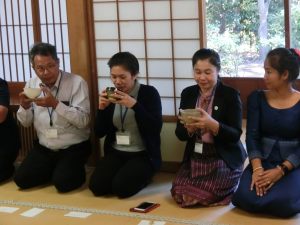
On the 7th day, the participants received a lecture by an officer of the Health, Labour and Welfare Ministry about the project of women’s protection as well as the flow of protection of TIP victims. During a workshop with caseworkers from the International Organization for Migration, the participants engaged in role-play discussion. At the end of the day, group activity “power walk” was held and everyone reaffirmed the importance of “leaving no one behind.”
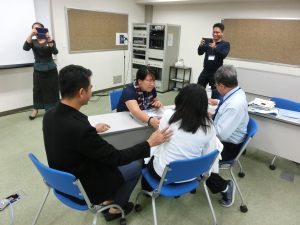 7th day: Role-playing.
7th day: Role-playing.
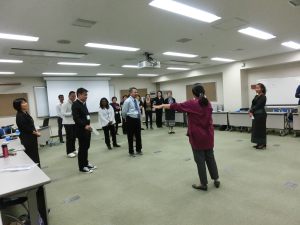 Group activity led by IOM.
Group activity led by IOM.
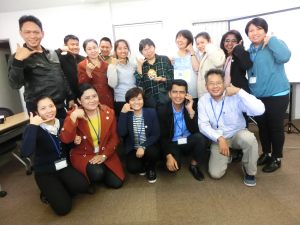 8th day: Yorisoi Hotline.
8th day: Yorisoi Hotline.
On the 8th day, the participants visited a general incorporated association Social Inclusion Support Center, and learned about the mechanism of Yorisoi Hotline as well as the whole concept of social inclusion having nationwide bases and connecting consulters firmly to social resources. They also visited the office of Solidarity Network with Migrants Japan (SMJ), and received a lecture on efforts being made by SMJ to eliminate discrimination against foreigners. They learned about difficulties foreign workers face in Japan, listened to TIP victims, and discussed about the human rights of migrant workers.
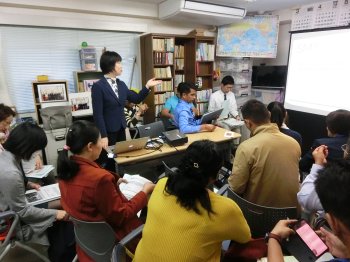 Visit to the SMJ office.
Visit to the SMJ office.
On the 9th day, a staff member of a public interest incorporated foundation Kanagawa International Foundation talked about efforts the foundation is engaged in to realize a society where foreign residents in Japan can live with a sense of security. The participants learned about livelihood information leaflets they create in various languages; cultural activities that connect communities with foreign background; support for Japanese language classes; counseling and support activities in line with life courses from prenatal to employment. In the afternoon, three lawyers from Lawyers for Trafficked Victims gave lecture, and the participants engaged in a lively exchange of questions and answers based on TIP cases.
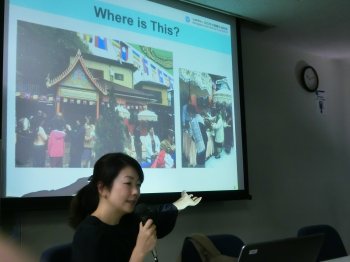 9th day: Lecture by Kanagawa International Foundation
9th day: Lecture by Kanagawa International Foundation
On the 10th day, a specialist from JICA’s Office for Gender Equality and Poverty Reduction talked about efforts JICA is making in the ASEAN region. As measures against underlying causes of TIP, the participants also learned about businesses that contribute to women’s financial independence and empowerment.
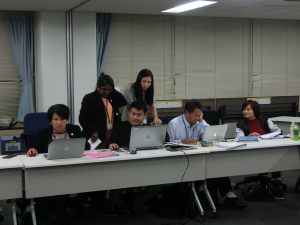 10th day: Preparing for the final seminar.
10th day: Preparing for the final seminar.
On the 11th day, the "Final Presentation and Discussion Seminar" was held at JICA Tokyo Office as a compilation of the training. In addition to lecturers who provided cooperation to the training, experts and representatives of relevant ministries and agencies, international organizations, private organizations, embassies in Japan attended the session. At the beginning, Professor Chiyo Ogaya of Ferris University gave a lecture on gender and migration. Then, the seminar participants presented what they learned through the two-week programs, as well as anti-TIP measures and action plans in their respective countries. At the end, everyone joined in reading out the statement of determination to eradicate trafficking in persons.
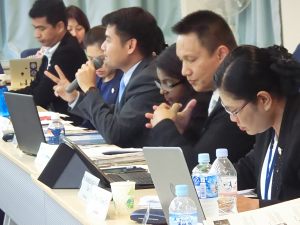 11th day: Presentation of seminar outcomes.
11th day: Presentation of seminar outcomes.
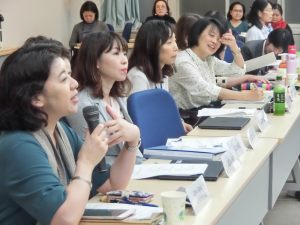 Comments from the experts.
Comments from the experts.
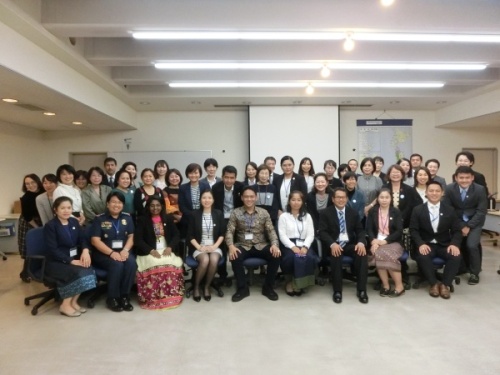 Commemorative photo of the Final Seminar participants.
Commemorative photo of the Final Seminar participants.
On the 12th day, a training review session and a closing ceremony were held.
 12th day: Closing ceremony.
12th day: Closing ceremony.
Having finished the two-week training, the participants who are overseeing anti-TIP measures in the ASEAN region made feedback comments that, through lectures, study tours, and discussions with the other participating countries, they gained a deeper understanding about anti-TIP efforts being made in ASEAN countries. Comments include “I learned a lot about the protection of victims and the prevention of TIP”; “I gained more skills and knowledge”; “I was able to make a comparison with the other participating countries, and learned about the need of gaining cooperation of people involved and networking with neighboring countries”; and “Considering the future of the hotline, I thought that cooperation of Southeast Asia will be important.”
NWEC expresses the deepest gratitude to the relevant ministries and agencies (Cabinet Office, the Ministry of Foreign Affairs, the Ministry of Justice, the Ministry of Health, Labour and Welfare, and the National Police Agency), prefectures (Tokyo and Kanagawa), embassies, international organizations, anti-TIP networks, private support organizations, experts, and networks engaging in support activities that offered considerable cooperation to lectures, exchange of opinions and study tours.
International Cooperation
- International Seminar
- FY2019 Seminar for Gender Equality Officers and Women Leaders in the Asia Region
- FY2018 Seminar for Gender Equality Officers and Women Leaders in the Asia Region
- FY2017 Seminar for Gender Equality Officers and Women Leaders in the Asia Region
- FY2016 Seminar for Gender Equality Officers and Women Leaders in the Asia Region
- FY2015 Seminar for Gender Equality Officers and Women Leaders in the Asia Pacific Region
- FY2014 Seminar for Gender Equality Officers and Women Leaders in the Asia Pacific Region
- FY2013 Seminar for Gender Equality Officers and Women Leaders in the Asia Pacific Region
- FY2012 Seminar for Gender Equality Officers and Women Leaders in the Asia Pacific Region
- FY2011 Seminar for Gender Equality Officer and Women Leaders in the Asia Pacific Region
- FY2010 Empowerment Seminar for Women Leaders in the Asia Pacific Region
- FY2009 Empowerment Seminar for Women Leaders in the Asia Pacific Region Final Report
- FY2008 Empowerment Seminar for Women Leaders in the Asia Pacific Region
- FY2007 Empowerment Seminar for Women Leaders in the Asia Pacific Region
- FY2006 Empowerment Seminar for Women Leaders in the Asia Pacific Region
- NWEC Global Seminar
- FY2025 NWEC Global Seminar: Addressing Technology-Facilitated Gender Based Violence (TFGBV): Approaches to Eradicate the Invisible Harm
- FY2024 NWEC Global Seminar: Gender Equality and Care
- FY2023 NWEC Global Seminar: Gender Mainstreaming & Strengthening Institutional Mechanism with Gender Perspective
- FY2022 NWEC Global Seminar: Does Digital Technology Advance Gender Equality?
- FY2021 NWEC Global Seminar: Combating Gender-Based Violence – “Building Back Better” from the Covid-19 Crisis
- FY2020 NWEC Global Seminar: Covid-19 and Gender
- FY2019 NWEC Global Seminar: Gender and Media
- FY2018 NWEC Global Seminar: Promotion of the Advancement of Women - What Japan can learn from Iceland about Gender Equality?
- FY2017 NWEC Global Seminar: Promotion for Advancement of Women Lessons from Germany
- FY2016 NWEC Global Seminar: Promotion for Advancement of Women –Lessons from Europe
- FY2015 International Symposium: Gender Equality and Women's Empowerment
- FY2014 International Symposium: Keys to Diversity and Women's Leadership
- FY2013 NWEC International Symposium:Gender Equality for Men
- FY2012 NWEC International Symposium:To Make a Society without Violence against Women a Reality
- FY2011 NWEC International Symposium
- FY2010 International Forum for Women's Empowerment
- FY2009 International Forum for Women's Empowerment
- FY2008 International Forum for Women's Empowerment Final Report3
- FY2008 International Forum for Women's Empowerment Final Report2
- FY2008 International Forum for Women's Empowerment Final Report1
- Cooperation with JICA
- FY2025 Knowledge Co-Creation Program (KCCP): "Promotion of Global Networking on Anti-Trafficking in Persons"
- FY2025 Knowledge Co-Creation Program "Eradicating Sexual and Gender-Based Violence (SGBV)"
- FY2025 Knowledge Co-Creation Program: Bangladesh “Strengthening Capacity to Address Gender-Based Violence"
- FY2024 Knowledge Co-Creation Program on "Promotion of Global Networking on Anti-Trafficking in Persons"
- FY2024 Knowledge Co-Creation Program "Eradicating Sexual and Gender-Based Violence (SGBV)"
- FY2023 Knowledge Co-creation Program "Promotion of Networking among ASEAN Countries on Anti-Trafficking in Persons”
- FY2023 Knowledge Co-Creation Program "Eradicating Sexual and Gender-Based Violence (SGBV)"
- FY2022 Knowledge Co-creation Program "Promotion of Networking among ASEAN Countries on Anti-Trafficking in Persons”
- FY2022 Knowledge Co-Creation Program "Eradicating Sexual and Gender-Based Violence (SGBV)"
- FY2021 Knowledge Co-creation Program "Promotion of Networking among ASEAN Countries on Anti-Trafficking in Persons”
- FY2020 Knowledge Co-creation Program "Promotion of Networking among ASEAN Countries on Anti-Trafficking in Persons”
- FY2019 Knowledge Co-creation Program "Promotion of Networking among ASEAN Countries on Anti-Trafficking in Persons”
- FY2018 Knowledge Co-creation Program "Promotion of Networking among ASEAN Countries on Anti-Trafficking in Persons”
- Issue-specific Training “Seminar on Promotiom of Networking among ASEAN Countries on Anti-Trafficking in Persons”
- Basic Information-Gathering Survey/Workshop Seminar on the Economic Independence for Women in Central America and the Caribbean (El Salvador/Dominican Republic)
- Regional Gender Seminar in Central and South America
- 2015 Issue-specific Training "Seminar on Promotion of Networking among Asian Countries on Anti-Trafficking in Persons"
- Seminar on the Promotion of Education for Girls and Women II
- International Conference/International Exchange
- Visit by Professor Hilado from the University of the Philippines Visayas
- Online meeting with Seisen International School elementary students
- Visitor: Mansfield Fellows
- Visitor:JICA Knowledge Co-Creation Program (KCCP) on "Women's Empowerment through Business for Central American Integration System (SICA) Member Countries"
- The 68th Session of the Commission on the Status of Women
- Visitor: Madam Sustjie Mbumba, First Lady of the Republic of Namibia
- Workshop of commemorating the donation of the Beate Shirota Gordon archive materials
- Meeting with Korean Women’s Development Institute (KWDI)
- The Coalition of Finnish Women's Associations (NYTKIS) Secretary General Ms. KAKKOLA’s Courtesy Call to Foreign Minister KAMIKAWA
- The Coalition of Finnish Women's Associations (NYTKIS) Secretary General Ms. KAKKOLA’s Japan Visit Program
- The 67th Session of the Commission on the Status of Women
- NGO CSW67 Forum
- Webinar with Korean Women’s Development Institute (KWDI)
- The 66th Session of the Commission on the Status of Women (Hybrid format)
- Online meeting with international graduate students from the Appropriate Technology course at the University of Tsukuba
- The 65th session of the Commission on the Status of Women
- Lecture "The Beate Sirota Gordon Archives at Mills College"
- Participation in 2nd AGenT
- The 64th session of the Commission on the Status of Women
- Dr. Wang from National Taiwan University visits NWEC
- Japan Network of Women Engineers and Scientists and The Japan Inter-Society Liaison Association Committee for Promoting Equal Participation of Men and Women in Science and Engineering: 9th Japan Korea China Women Leaders Forum for Science & Technology
- Researcher from the KWDI visits NWEC
- Visit by a delegation from the Socialist Republic of Vietnam Ministry of National Defense
- Briefing on the Reykjavik Index for Leadership
- Women's Archives Center Exhibition "Beate Sirota Gordon and gender equality in Japanese Constitution"
- Visit from the Guangxi Women’s Federation
- Participation in the 63rd Session of the Commission on the Status of Women
- 7th Global Forum on Gender Statistics
- FY2018 International Symposium hosted by Korean Institute for Gender Equality Promotion and Education “Gender Equality at Schools”
- Visit from All-China Women’s Federation(ACWF)
- Participation in the 62nd Session of the Commission on the Status of Women
- The 14th KIGEPE International Symposium “Empowering Women’s Leadership: expanding influence and innovation”
- Participation in the 61st Session of the Commission on the Status of Women
- Visit from the Batis Center for Women
- 2011 Asia Women Eco-Science Forum (a forum of science and engineering leaders in Japan, China and Korea)
- The 60th Session of the Commission on the Status of Women
- The 59th Session of the United Nations Commission on the Status of Women
- The 58th Commission on the Status of Women
- The 57th Session of the United Nations Commission on the Status of Women
- International Symposium: Gender Awareness Education for Sustainable Development
- Thirtieth Anniversary Programs
- Attendance at the Ceremony Commemorating the 25th Anniversary of the Korean Women’s Development Institute (KWDI)
- Japanese-Filipino children (JFC)* from the Philippines-based NGO “DAWN” visit the Center
- Visitors from Abroad to NWEC
- Research report on Multicultural Family Support in South Korea
- Workshop on Gender and Education: Life-long Learning for Women’s Empowerment
- Lecture Delivered by a Visiting Researcher
- Connections: Bringing Together the Next Generation of Women Leaders in Science, Technology, Engineering and Mathematics
- Conclusion of Memorandum of Understanding on Exchange and Cooperation with the Ministry of Women's Affairs, Royal Government of Cambodia
- Visit to Japan by the Minister of Women’s Affairs of the Royal Government of Cambodia
- KIGEPE Delegation Visit
- Officials of Ministry of Information and Communications of the Socialist Republic of Vietnam visited NWEC
- The 56th Commission on the Status of Women
- Dr. Barker's visit
- Multidisciplinary Intellectual Exchange for Women Leaders from the United States, Japan, South Korea and the Philippines
- Courtesy visit to University of Hawai`i
- Delegation of Board for the Advancement of Women, Ministry of Finance of the Socialist Republic of Vietnam visited NWEC
- Visit Korean Women's Development Institute (KWDI)
- Report on Participation in the 5th World Social Forum on Migration
- A group led by the Vice President of the Korean Women's Development Institute visited NWEC
- A disaster management specialist from India visits the Center
- Visit to the Korean Institute for Gender Equality Promotion & Education (KIGEPE) and others
- Secretary of State, Ministry of Justice, Kingdom of Cambodia visited NWEC
- Research conducted in the Republic of the Philippines
- Research on the Comparative Study of the Gender Equality Policy in Southeast Asian Countries in the Kingdom of Cambodia
- Ochanomizu University and A Canadian Women’s Study Researcher visited NWEC
- Aigyung Yang, Research Fellow and Former Director of Strategy Board for Women Friendly Policies of the Korean Women's Development Institute (KWDI) Visits NWEC
- Delegation of the Ministry of Defense of the Socialist Republic of Vietnam visited NWEC
- Delegation from the Women and Development Center, of the Vietnam Women's Union, Visited NWEC
- The "7th Asia-Pacific Forum on Development and Gender" was held in Seoul, South Korea
- HOME
- International Cooperation
- Cooperation with JICA
- Cooperation with JICA
- FY2018 Knowledge Co-creation Program "Promotion of Networking among ASEAN Countries on Anti-Trafficking in Persons”

